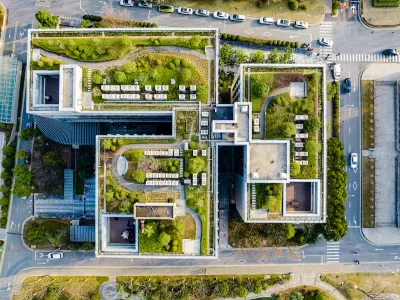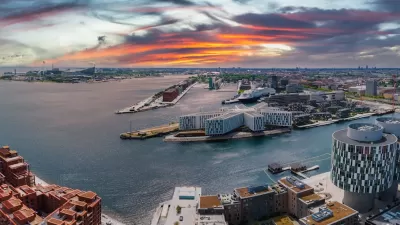The cheapest energy is energy not used.

A white paper released by the World Economic Forum and PwC outlines “actionable interventions” that could reduce emissions from buildings by up to 38 percent. As Nish Amarnath explains in Smart Cities Dive, these interventions include efficiency measures and electrification.
“Demand-side actions can be undertaken by “‘reallocating previously wasted or unnecessarily used energy to new consumers and/or new uses,’ the paper says, noting that the cheapest form of energy is ‘energy that is not used.’” In addition to reducing the amount and intensity of energy used, the paper recommends “retrofits and other upgrades that enable buildings to use less energy to perform the same task and are typically funded by capital expenditure with payback in less than 15 years.”
The paper adds a more systemic solution. “As a third lever, it recommends collaboration measures across the value chain, such as changing building design, putting in place district heating and cooling systems and district energy management systems, on-site energy production and storage, and the use of greener materials as well as demand response programs.”
FULL STORY: Buildings can reduce energy intensity by up to 38%: report

Maui's Vacation Rental Debate Turns Ugly
Verbal attacks, misinformation campaigns and fistfights plague a high-stakes debate to convert thousands of vacation rentals into long-term housing.

Planetizen Federal Action Tracker
A weekly monitor of how Trump’s orders and actions are impacting planners and planning in America.

In Urban Planning, AI Prompting Could be the New Design Thinking
Creativity has long been key to great urban design. What if we see AI as our new creative partner?

Massachusetts Budget Helps Close MBTA Budget Gap
The budget signed by Gov. Maura Healey includes $470 million in MBTA funding for the next fiscal year.

Milwaukee Launches Vision Zero Plan
Seven years after the city signed its Complete Streets Policy, the city is doubling down on its efforts to eliminate traffic deaths.

Portland Raises Parking Fees to Pay for Street Maintenance
The city is struggling to bridge a massive budget gap at the Bureau of Transportation, which largely depleted its reserves during the Civd-19 pandemic.
Urban Design for Planners 1: Software Tools
This six-course series explores essential urban design concepts using open source software and equips planners with the tools they need to participate fully in the urban design process.
Planning for Universal Design
Learn the tools for implementing Universal Design in planning regulations.
Gallatin County Department of Planning & Community Development
Heyer Gruel & Associates PA
JM Goldson LLC
City of Camden Redevelopment Agency
City of Astoria
Transportation Research & Education Center (TREC) at Portland State University
Jefferson Parish Government
Camden Redevelopment Agency
City of Claremont





























